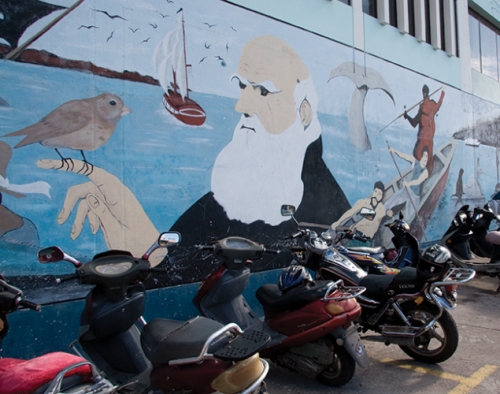Early this spring, on the two hundredth anniversary of Charles Darwin’s birth, I flipped a kayak in the cold, choppy waters of Academy Bay, one of Darwin’s ports of call in his year-long exploration of the Galapagos Islands. My excuse? The boss dared me to take a fast but tippy boat. Not very evolved of me, you might say. And you would be right.
After an hour or so battling the wind and whitecaps off Angermeyer Point, we finally regained the harbor and came ashore near an enormous mural depicting the great man himself, a finch perched on his finger. At that moment, it occurred to me that our landing was very much like the weary, waterlogged arrival of almost every other form of life that ever gained a foothold on this prickly slab of rock. But as they came ashore, those other living things got busy evolving. We humans would do well to follow their example.
We were in the Galapagos to plan a research program that will, with our partners in Ecuador, attempt to figure out what Homo sapiens, an especially aggressive invasive species, is doing to the most famous ecosystem in the world. In several parts of the islands, tourists and settlers have polluted the groundwater, imported all manner of alien pests, and plundered sea cucumbers and other species almost to the point of extinction. In this year for celebrating Darwin, we are hoping that science can help turn that trend around.
Perhaps the most obvious way to honor Darwin in this magazine would be to write about research on the topic of evolution. But when Darwin went to the Galapagos as a young man, evolution wasn’t on his mind. Having studied medicine and divinity, and dabbled in geology, Darwin hitched a ride with Captain FitzRoy aboard the HMS Beagle for the pure adventure of exploring new lands. By our great fortune, Darwin turned out to be a gifted observer, and his elegant prose is an inspiration to anyone who studies the natural world. And so in this issue, we honor Darwin with several stories about scientists who are doing as he did, exploring life in its amazing abundance, wherever it might lead.
Neil Caudle was the editor of Endeavors for fifteen years.


